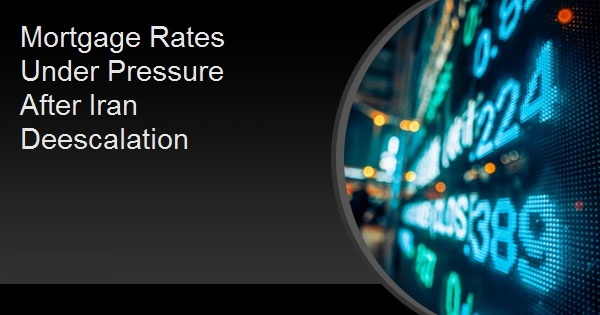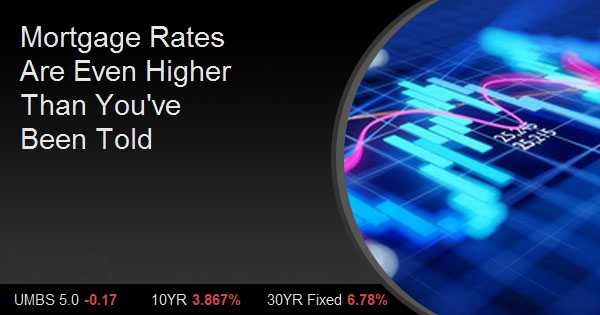Mortgage Rates Under Pressure After Iran Deescalation
Mortgage rates moved higher today after spending several recent days in line with the lowest levels in more than a month. Underlying bond markets have been taking their biggest cues from geopolitical developments surrounding US/Iran tensions. Those came to a head last night after Iran attacked two air bases in Iraq where US troops are stationed.
The average opinion shared on the internet or TV news suggested a likelihood that this meant war. War would be good for rates and bad for stocks. Markets reacted accordingly--at least for a few hours. Things changed when we learned Trump would not address the nation until the morning and that there were no US casualties (seen as the deciding factor in US military retaliation).
In today's speech, Trump effectively deescalated the situation and communications from Iran suggested this was the extent of their retaliation for the recent US attack. Given that high tensions have been helping rates stay lower than they otherwise would be, the de-escalation is logically pushing back in the other direction. US Treasuries are experiencing most of the pressure, but some of it is spilling over into the market for mortgage-backed bonds--something that could easily continue tomorrow. The implication is that mortgage rates should be considered to be facing upward pressure until further notice.
Loan Originator Perspective
Iranian hostilities appear to be waning today, and bond markets posted moderate losses. My pricing was still close to Tuesday's, so I locked several February closings. For now, it appears rates are more likely to rise than fall. I'll be conservative with my locks until more tariff or international drama surface. -Ted Rood, Senior Originator
Today's Most Prevalent Rates For Top Tier Scenarios
- 30YR FIXED - 3.75%
- FHA/VA - 3.375%%
- 15 YEAR FIXED - 3.375%
- 5 YEAR ARMS - 3.25-3.75% depending on the lender
Ongoing Lock/Float Considerations
- 2019 has been the best year for mortgage rates since 2011. Big, long-lasting improvements such as this one are increasingly susceptible to bounces/corrections
- Fed policy and the US/China trade war have been key players. Major updates on either front could cause a volatile reaction in rates
- The Fed and the bond market (which dictates rates) will be watching economic data closely, both at home and abroad, as well as trade war updates. The stronger the data and trade relations, the more rates could rise, while weaker data and trade wars will lead to new long-term lows.
- Rates discussed refer to the most frequently-quoted, conforming, conventional 30yr fixed rate for top tier borrowers among average to well-priced lenders. The rates generally assume little-to-no origination or discount except as noted when applicable. Rates appearing on this page are "effective rates" that take day-to-day changes in upfront costs into consideration.





